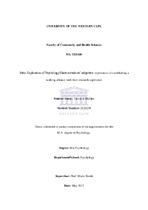Exploration of Psychology Masters students' subjective experiences of establishing a working alliance with their research supervisor
Abstract
The state of postgraduate studies in South Africa has come under renewed enquiry
in recent years as concern is placed on the inconsistency between postgraduate enrolment and
graduation rates. The discrepancy between the enrolment and completion rates is attributable to
a range of factors. Literature identified the supervisory relationship as an important and
significant factor in predicting completion. The establishment of a good working alliance in the
beginning of the thesis process has been identified as a crucial task. As a result, it is useful to
gain insight into how students set about establishing working relationships with new
supervisors and how they rate the quality thereof. The present study was conducted with
Psychology Masters students who were in their first semester of the first enrolment in the
Community and Health Sciences faculty at the University of the Western Cape. Attachment
theory provided the theoretical framework for the study as it posits that the quality of current
relationships are a function of early relationship experiences. Thus students were thought to
draw on earlier experiences when setting about establishing new relationships such as the
supervisory relationship. The study was exploratory and descriptive in nature. Semi-structured
interviews were conducted with eleven eligible participants who have been selected
purposively. Transcriptions have been subjected to a Thematic Analysis. Ethics clearance has
been requested from and granted by the Senate Research Committee and all relevant ethics
principles such as, confidentiality, anonymity, voluntary participation and informed consent,
have been adhered to. Findings indicated that supervision was a central component for
graduate completion, underscoring the importance of early supervisory sessions to form a
strong working alliance. Furthermore, the findings indicated that the supervisor's role in
providing the expertise and support largely contributed to the success of establishing strong
and productive supervisory relationships. Participants perceived strong supervisory
relationships as necessary to foster completion of higher degree requirements. The
development of a new supervisory relationship activated relational patterns for students that
underscored the importance of recognizing the supervisory relationship as a relationship.

